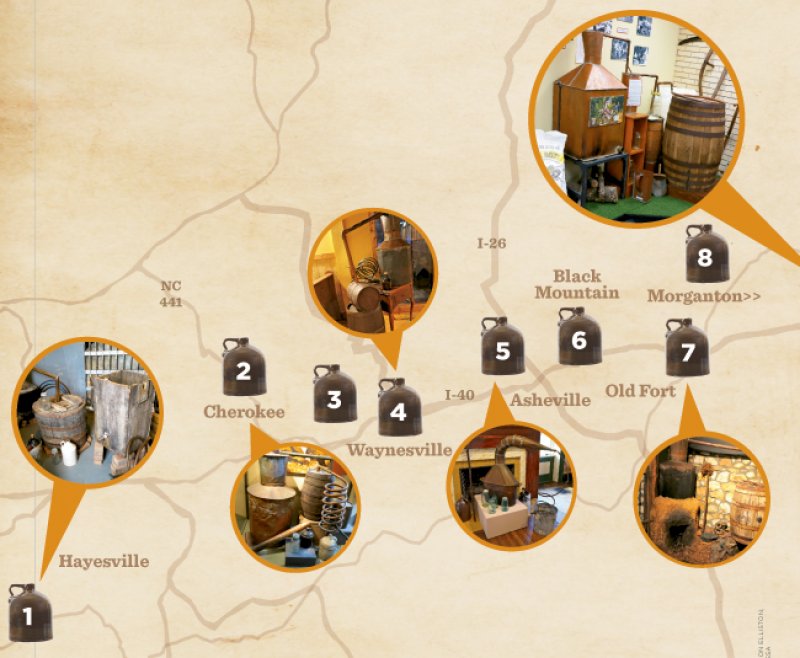’Shine On
’Shine On : Make a moonshine run to see some of WNC’s historic stills
Appalachia’s rich moonshine heritage was long taboo, but no longer: White lightening is increasingly part of a proud history. “No other product is more iconic and more associated with traditional life in the Great Smoky Mountains than illegally distilled, un-aged, white corn liquor,” notes UNC Asheville history professor Dan Pierce in Corn From a Jar, his 2013 tribute to the illicit elixir. Need proof? Look no further than our custom-designed moonshine heritage trail, which stretches from Hayesville to Morganton and features eight historic stills that are on public display. Some date back to the 1890s, some are almost contemporary, and each holds its own tale of making mountain dew. Take in the entire 180-mile road trip if you’re thirsting to see them all, or sip in just a few. (Either way, be sure to call ahead to check these establishments’ hours, which vary widely.)
1 » Clay County Historical & Arts Council
This still is ironically and lovingly lodged in the former county jail, which now hosts a top-notch local history museum. Surrounded by a stellar diorama, it’s all the more intriguing once you read about the practitioner of the moonshine arts who put it together. 21 Davis Loop, Hayesville; (828) 389-6814; www.clayhistoryarts.org
2 » Oconaluftee Visitor Center
This relatively new Great Smoky Mountains National Park facility is packed with great history, including this no-nonsense gem of a still. “We don’t know exactly where and when we got it,” says curator John McDade. “The park confiscated a lot of stills in its early years, that’s for sure.” 1194 Newfound Gap Rd., Cherokee; (828) 497-1904; www.nps.gov/grsm/planyourvisit/visitorcenters
3 » Red Barn Garden Center & Mountain Heritage Museum
In a museum that oozes homegrown authenticity, this still is a standout. Found in a Maggie Valley laurel thicket, it’s a rare variety made out of galvanized steel, rather than copper—a major, and dangerous, moonshining no-no. Ask museum owner/curator Karen Collis to show you the gash from a revenuer’s axe. 1856 Dellwood Rd., Waynesville; (828) 926-1901
4 » Maggie’s Galley Seafood Restaurant
It’s safe to say that mountain moonshine was rarely consumed with seafood, but that only enhances the novelty of this still’s locale. At Maggie’s Galley, the impressive apparatus greets diners at the door, and feels right at home. 1374 Sulphur Springs Rd., Waynesville; (828) 456-8945; www.maggiesgalley.com
5 » Smith-McDowell House Museum
Run, don’t amble, to check out this exquisitely designed specimen: It’s on loan from a local antique shop and will leave the museum at the end of this year. A display notes that, between the 1890s and 1950s, “most residents of the rural mountains had at least some involvement with the moonshine business.” 283 Victoria Rd., Asheville; (828) 253-9231; www.wnchistory.org
6 » Swannanoa Valley Museum
This behemoth, one of the biggest stills on our tour, hails from a holler near Barnardsville. As the story goes, the county sheriff knew of the still, but was wary of approaching it, lest he get shot. So he found a local intermediary to appeal to the moonshiners to hand it over, which they begrudgingly did. 223 W. State St., Black Mountain; (828) 669-9566; www.swannanoavalleymuseum.org
7 » Mountain Gateway Museum
What better welcome to the mountains than a full-fledged moonshine recreation? At this state-run museum, the still is cobbled together from several that have been donated through the years. All of the pieces are authentic and local—as is the stuffed rattlesnake that’s perpetually poised and seems ready to strike at unwelcome visitors. 24 Water St., Old Fort; (828) 668-9259; www.mountaingatewaymuseum.org
8 » The History Museum of Burke County
This beauty was donated to the museum by a state Alcoholic Beverage Control officer, who got it in a 1970s bust. The still has modern pipe fittings and appears in the museum’s agriculture history room, highlighting the corn in “corn squeezins.” Also on view are archival photos of notable local moonshine raids. 201 W. Meeting St., Morganton; (828) 437-1777; www.thehistorymuseumofburke.org
